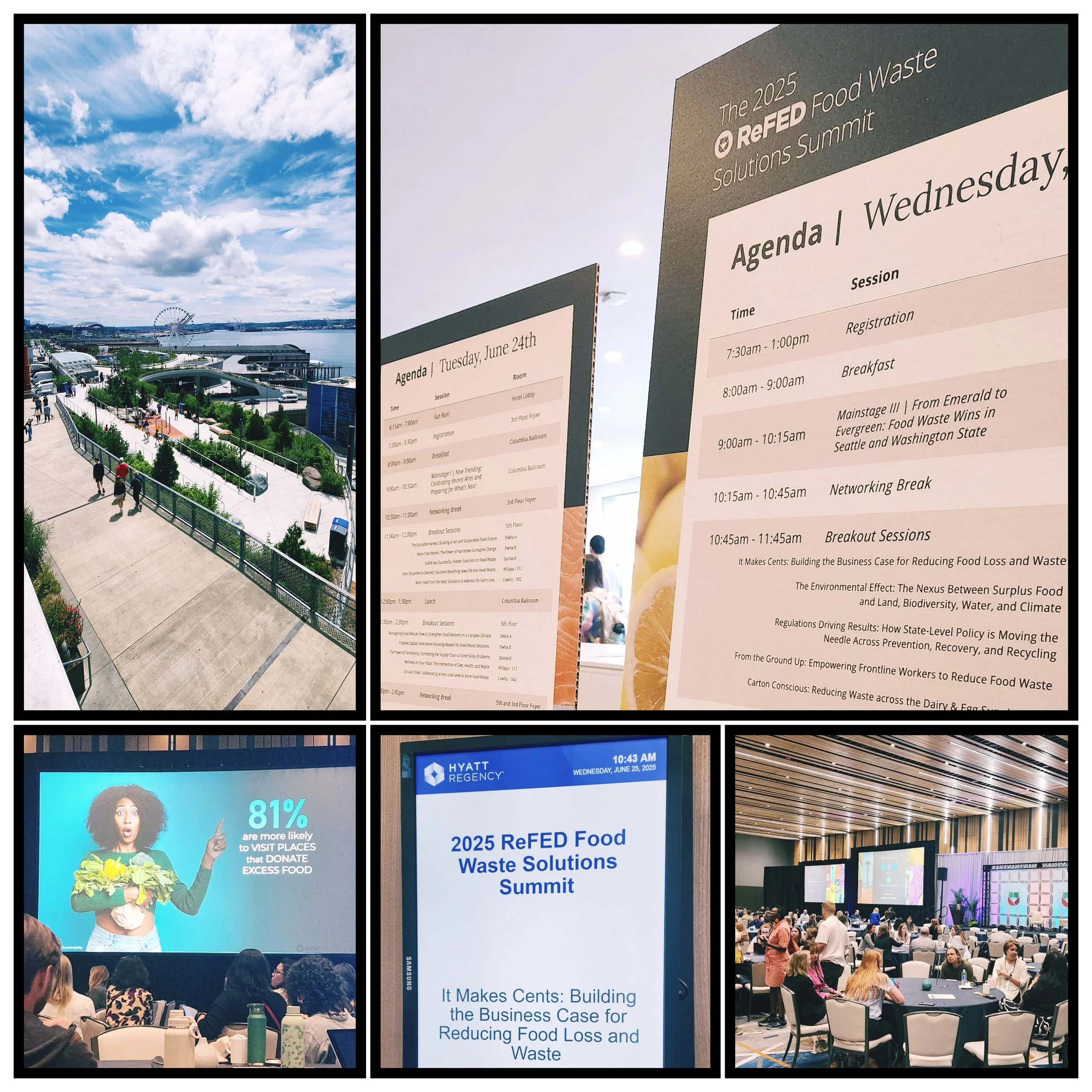Collaboration, Innovation, and Hope in Tackling Food Waste
7/1/25 - Reflections from the ReFED Summit: Collaboration, Innovation, and Hope in Tackling Food Waste
Jess Palmer, Program Director
This past week, I had the opportunity to attend my first ReFED Summit in Seattle and thoroughly enjoyed the three-day event. While the food system faces enormous challenges and uncertainties, the overall tone was one of positivity, collaboration, and a firm resolve to double- and triple-down on addressing food waste.
The conference kicked off with field trips, and I chose to visit FareStart, a nonprofit providing culinary job training to individuals facing low income and other employment barriers. Their 12-week program has graduated over 15,000 people, with approximately 80% securing steady employment after graduation.
FareStart’s impact extends through partnerships as well. They collaborate with PCC Community Markets, a local co-op, to repurpose day-old bread into croutons sold at the markets and used in their salad bars. Later this summer, PCC will open a new corner market in downtown Seattle, where FareStart’s culinary students will provide grab-and-go breakfast sandwiches and burritos—a great example of reducing waste while creating opportunity.
Seattle Public Utilities (SPU) shared the city’s journey toward banning food waste, beginning in 2009 with single-family residences and gradually expanding to multifamily complexes and businesses by 2015. While food waste still accounts for around 20% of their garbage, major progress has been made through composting programs, food rescue initiatives, and sustained public outreach. SPU also partners closely with the State of Washington on its Use Food Well plan, which aims to reduce food waste by 50% by 2030.
Presentations from companies like Guckenheimer, Amazon Go, Compass Group, Ecotone Renewables, Northstar Recycling, Starbucks, Whole Foods, and Walmart painted a complex and multifaceted picture of the food waste ecosystem.
One standout project involved stacking food tracking data systems in corporate commissaries, which led to a 30% reduction in food waste. The U.S. Food Waste Pact shared how they develop and implement data-driven strategies for food businesses globally. Other companies are innovating on the consumer side, with technologies like countertop compost systems for homes and anaerobic digesters in shipping containers to manage waste from clusters of restaurants.
Beyond the sessions, I had constant opportunities to connect with inspiring people doing vital work. I met Rhona, a restaurant owner who pivoted during the pandemic to collect surplus food and cook meals for people in need. She now runs a team of chefs and a 20-person staff at Feed Louisville.
Paddy from Daily Bowl and Mike from Abound Food Care shared their role in founding the California Food Recovery Coalition, a network supporting food recovery organizations throughout the state. I also had the chance to reconnect with Jen and Brad from Food Rescue Hero and our very own Joe Robbins from Food Rescue US.
It was a whirlwind few days, and with so much information shared, it’s easy to feel overwhelmed. Facts like “63 million tons of food are wasted in the U.S. each year,” “landfills are nearing capacity,” and “climate change is decreasing crop nutrient density and plant productivity” can be daunting. But amidst that urgency, there’s also momentum.
According to research from Planet FWD, sustainability is no longer optional—it’s necessary. Datassential found that 58% of consumers say sustainability influences their day-to-day food choices, and 81% are more likely to support businesses that donate surplus food. And when you consider that the average family of four wastes $3,000 worth of food annually, it becomes clear that this is not just an environmental issue—it’s an economic one, too.
Food waste is a non-partisan issue. No one wants to see food—or the valuable resources that go into producing it, from fertilizer and water to labor and transportation—go to waste. Yet transforming a massive, operationally-efficient, and paradoxically wasteful food system requires cultural change, persistence, and partnership.
I left the ReFED Summit feeling hopeful. While the scale of the challenge is great, the people working in food systems are an optimistic, solutions-focused community. And progress doesn’t have to start on a grand scale. It can begin at home—by wasting less, volunteering with food rescue organizations, or supporting food recovery programs.
In my role at Keep Austin Fed, I’m more committed than ever to building partnerships with food businesses, expanding donation programs, and finding new ways to get food to our neighbors in need. Change is happening—and together, we can keep it going.

